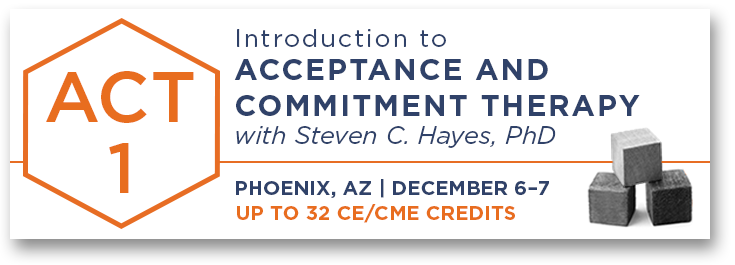Author: Matthew S. Boone, LCSW
What do people who are new to ACT training need to know about it?
The most important thing to know is that acceptance and commitment therapy (ACT) trainings are experiential. Going to an ACT workshop won’t be much fun if you’re just interested in clocking some CEU hours. In order to show you how to bring psychological flexibility into the lives of your clients, ACT workshops encourage you to become more psychologically flexible yourself through various experiential exercises.
So rather than just walking you through a hundred PowerPoint slides, we help you get a deeply felt gut-level sense of what it means to be more mindful with your thoughts and feelings and to be more connected to your values. We’re not going to just talk to you about acceptance; we’re going to show you what it’s like, in the moment, to be accepting with whatever shows up inside of you. To do that, we have to get experiential, not just intellectual. Experiential exercises can be anything from a simple five-minute mindfulness meditation, where you just notice what’s available to you through your five senses, to more elaborate exercises, like “Take Your Mind for a Walk.” In “Take Your Mind for a Walk,” you silently walk around the room followed by a partner who plays the part of your mind. As you walk, your partner chatters, comments, judges, predicts, worries, daydreams—everything the mind is built to do. Meanwhile you just walk in whatever direction you want to go regardless of what your mind says. It helps you experience what we call cognitive defusion: noticing the process of thinking as it occurs and making choices independent of what your mind is telling you. It helps participants see for themselves that actions can be independent of thinking. It’s a classic in the ACT training cannon.
What can participants expect from you as a trainer?
The feedback that I get in my training evaluations is that I’m energetic, playful, and emotionally connected. I’m kind of a ham, and I like to make people laugh. At the same time, I take this work very seriously, and if you don’t walk out of the training with new skills and a strong motivation to learn more, then I haven’t done my job. I like to devote a lot of the workshop to participant questions and small group exercises so that people can really engage with ACT personally, not just sit passively in the back of the room receiving information. I think this style can be a little bit intimidating for folks at first. It’s a lot easier to just be a passive recipient, but I know for myself, and I think it’s true for most people, that if you are really engaging in a workshop you’re going to learn a lot more. You’re also going to have a lot more fun.
What’s the biggest challenge for you as an ACT trainer?
I think, like a lot of trainers, the biggest challenge for me is helping people deeply understand what it means to pay attention to the function of behavior in its context. This unusual language of “function” and “context” comes from the behavioral tradition. In ACT, and in the behavioral tradition writ large, we don’t think of behavior as being caused by any one thing. We think that behavior arises, in any given moment, out of the individual’s historical and situational contexts. So we are not going to arrive at simple explanations of causality, such as a client being depressed simply because they have a problem with their neurotransmitters or because they have dysfunctional thinking. That might be part of the overall puzzle. But we’re going to look at all the factors that evoke and reinforce a particular behavior—say, lying in bed all day—and what reinforces it. We are also going to try to observe how we can use this understanding to make simple shifts in context to support new, more effective behaviors. For example, we might help the depressed person notice the payoff to lying in bed all day, such as avoiding difficult feelings or stressful obligations. And we might offer them new skills, based in acceptance and mindfulness, for responding to their pain. This perspective can be a little tricky for folks who haven’t spent much time thinking behaviorally. That was certainly the case for me when I first started. To make it as clear as possible, I try to weave this understanding into every part of the training so that we’re always talking about the function of behavior as an underpinning to basic ACT concepts like acceptance and values. And, hopefully, by the time the workshop comes to an end, participants begin to really see the function of behavior as it arises from moment to moment—both in themselves and in their clients.
See also: Outcomes with ACT: Behavior in Context
What do you like most about ACT trainings?
As a participant—and I’ve been to a lot of ACT workshops myself—I like the combination of intellectual and experiential learning. I like how the training touches my heart as well as stimulates my mind. That sounds a little hokey, but it’s really what makes it meaningful. As a trainer, the best part is noticing participants getting enthusiastic about the work in the same way that I’ve gotten enthusiastic about it: to see people really catching on to the concepts, tying it to the work they already do, and challenging themselves to do some new things. I especially like it when participants take risks in my workshop. Between the first and the second day, I ask attendees to do something bold, something they might have otherwise avoided. That bold thing can be quite small. Often it’s simply focusing on self-care when you might usually ignore it. Or it could be calling a family member you haven’t talked to in a long time. This “bold move,” as we call it, is whatever you can do that evening in the midst of everything else you have planned. Something short and sweet. We then talk about the bold moves the next morning, noticing what it was like to do things that were meaningful that might have also evoked some uncomfortable thoughts and feelings. That’s what acceptance and commitment is. It’s really a lovely conversation. It’s a conversation that’s about the therapists themselves, but it’s a hundred percent applicable to their clients. That’s probably my favorite moment in the whole workshop.
Join Us. Learn How ACT Can Improve the Quality of Life For You and Your Clients!

